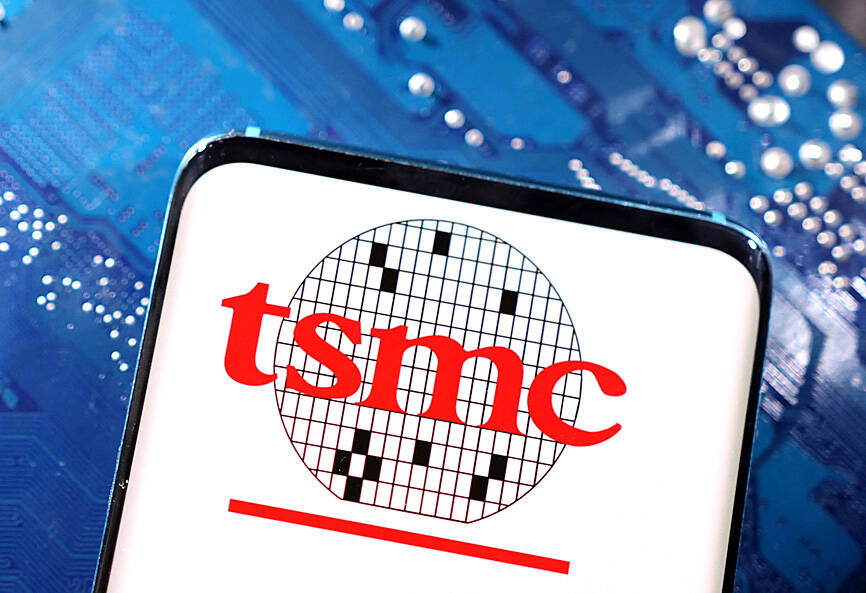The Investment Commission yesterday approved a Taiwan Semiconductor Manufacturing Co (TSMC, 台積電) application to invest an additional US$3.5 billion in its Arizona subsidiary to manufactured advanced chips.
The world’s largest contract chipmaker’s board of directors last month approved the funding project after TSMC started moving manufacturing equipment into the fab in December last year in preparation for the production of 4-nanometer chips next year.
TSMC said it has also commenced the second phase of facility construction in Arizona.

Photo: Reuters
The second fab is to produce semiconductors using 3-nanometer technology in 2026. Altogether, TSMC plans to spend US$40 billion on the Arizona fabs, doubling its original investment of US$20 billion.
The US became the fastest-growing overseas investment destination for local enterprises last year, enjoying an annual growth rate of 128.32 percent to US$1.09 billion from 100 projects, the commission said in a statement.
Cloud-based server maker Wiwynn Corp (緯穎科技) plans to invest US$400 million on its US marketing subsidiary Wiwynn International Corp to meet robust demand from the US market, it said.
It approved that investment plan during yesterday’s meeting.
It also approved a plan from Hon Hai Precision Industry Co (鴻海精密), a major iPhone assembler, to invest US$500 million indirectly in India to produce iPhones and smartphone components through its Foxconn Singapore Pte Ltd subsidiary.
The company was also granted approval to invest more than US$361 million indirectly in its Mexican subsidiary to make components used in electric vehicles through its Singaporean unit ECMMS Precision Singapore Pte Ltd, the commission said.
PharmaEssentia Corp (藥華醫藥) received permission to invest US$80 million in its Japanese subsidiary and US$200 million in a US subsidiary, as the company prepares to sell new drugs in the countries, it said.
The commission also approved Yunlin Holding GmbH’s plan to invest NT$29.23 billion (US$962.4 million) in offshore wind energy developer Yunneng Wind Power Co (允能), a subsidiary of Skyborn Renewable Taiwan Co (天豐新能源), to improve its financial structure.
The company is developing an offshore wind power project off Taiwan’s west coast, which is to comprise 80 wind turbine generators with a total capacity of 640 megawatts rated power.

POWERING UP: PSUs for AI servers made up about 50% of Delta’s total server PSU revenue during the first three quarters of last year, the company said Power supply and electronic components maker Delta Electronics Inc (台達電) reported record-high revenue of NT$161.61 billion (US$5.11 billion) for last quarter and said it remains positive about this quarter. Last quarter’s figure was up 7.6 percent from the previous quarter and 41.51 percent higher than a year earlier, and largely in line with Yuanta Securities Investment Consulting Co’s (元大投顧) forecast of NT$160 billion. Delta’s annual revenue last year rose 31.76 percent year-on-year to NT$554.89 billion, also a record high for the company. Its strong performance reflected continued demand for high-performance power solutions and advanced liquid-cooling products used in artificial intelligence (AI) data centers,

SIZE MATTERS: TSMC started phasing out 8-inch wafer production last year, while Samsung is more aggressively retiring 8-inch capacity, TrendForce said Chipmakers are expected to raise prices of 8-inch wafers by up to 20 percent this year on concern over supply constraints as major contract chipmakers Taiwan Semiconductor Manufacturing Co (TSMC, 台積電) and Samsung Electronics Co gradually retire less advanced wafer capacity, TrendForce Corp (集邦科技) said yesterday. It is the first significant across-the-board price hike since a global semiconductor correction in 2023, the Taipei-based market researcher said in a report. Global 8-inch wafer capacity slid 0.3 percent year-on-year last year, although 8-inch wafer prices still hovered at relatively stable levels throughout the year, TrendForce said. The downward trend is expected to continue this year,

Vincent Wei led fellow Singaporean farmers around an empty Malaysian plot, laying out plans for a greenhouse and rows of leafy vegetables. What he pitched was not just space for crops, but a lifeline for growers struggling to make ends meet in a city-state with high prices and little vacant land. The future agriculture hub is part of a joint special economic zone launched last year by the two neighbors, expected to cost US$123 million and produce 10,000 tonnes of fresh produce annually. It is attracting Singaporean farmers with promises of cheaper land, labor and energy just over the border.

US actor Matthew McConaughey has filed recordings of his image and voice with US patent authorities to protect them from unauthorized usage by artificial intelligence (AI) platforms, a representative said earlier this week. Several video clips and audio recordings were registered by the commercial arm of the Just Keep Livin’ Foundation, a non-profit created by the Oscar-winning actor and his wife, Camila, according to the US Patent and Trademark Office database. Many artists are increasingly concerned about the uncontrolled use of their image via generative AI since the rollout of ChatGPT and other AI-powered tools. Several US states have adopted